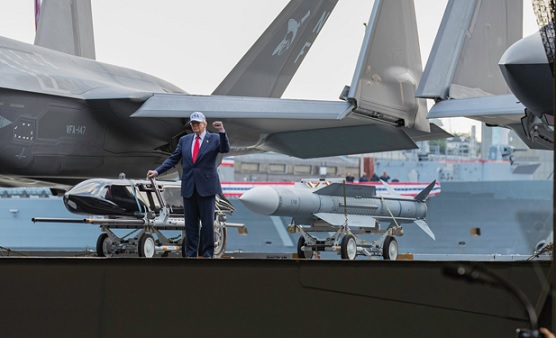FPI / November 6, 2025
By Richard Fisher
During their respective trips to Asia, President Donald J. Trump (Oct. 25 to 30) and Secretary of War Pete Hegseth (Oct. 26 to Nov. 4) took major steps to strengthen deterrence against a more powerful and confident China.

While these steps were necessary responses to China rapidly increasing its nuclear forces while refusing any nuclear control negotiations and China’s use of its growing naval and air forces to harass Taiwan, the Philippines and Japan, Trump was also careful to try to sustain something he prizes: A cordial personal relationship with Chinese Communist Party leader Xi Jinping.
During their Oct. 30 one hour and 40-minute summit in Busan, South Korea on the sidelines of the Asia Pacific Economic Cooperation (APEC) forum, Trump and Xi traded concessions on U.S. tariffs for Chinese concessions — of questionable sincerity — on halting Fentanyl precursor exports and halting Chinese planned embargoes that would deny Rare Earth Elements to U.S. industry, and increasing imports of U.S. agricultural products.
China’s Foreign Ministry on Oct. 30 confirmed that Trump will travel to China in April 2026, presumably, for Trump’s long desired major meeting with Xi, and will have the chance for a follow up at the 2026 APEC meeting that will take place in Shenzhen, China.
For his part, after his meeting with Chinese Minister of Defense Admiral Dong Jun, during the Oct. 31 Association of Southeast Asian Nations (ASEAN) Defense Minister’s meeting in Kuala Lumpur, Malaysia, Hegseth announced on Nov. 1 that China and the U.S. would resume military-to-military communications.
While the history of U.S.-People’s Liberation Army (PLA) “mil-to-mil” talks has been most disappointing, with the PLA rarely “picking up the phone” during crises, this gesture advances Trump’s agenda for trying to produce dialogue with Xi Jinping.
Earlier at the ASEAN meeting Hegseth stated, “China’s sweeping territorial and maritime claims in the South China Sea fly in the face of their commitments to resolve disputes peacefully…We seek peace. We do not seek conflict. But we must ensure that China is not seeking to dominate you or anybody else.”
The positive actions that strengthen deterrence of China taken by Trump and Hegseth include:
Trump announces U.S. resumption of nuclear testing
On Oct. 30, before his summit with Xi Jinping in Busan, South Korea, Trump posted on social media:
“Because of other countries’ testing programs, I have instructed the Department of War to start testing our Nuclear Weapons on an equal basis. That process will begin immediately…Russia is second, and China is a distant third, but will be even within 5 years.”
Trump caused global shock inasmuch as the U.S. has since 1992 committed unilaterally not to test nuclear weapons, a moratorium that had been followed by Russia and China, after 1996.
Full Report . . . . Current Edition . . . . Subscription Information
